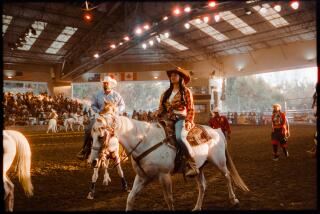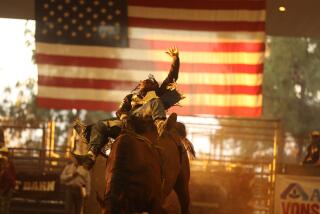Rodeo Cowboys Are Working to Form Union
- Share via
DENVER — For generations, rodeo riders were working cowboys who picked themselves up, dusted themselves off and limped into the sunset with a little cash in their jeans after a bruising day of bronc riding or calf roping.
Nowadays, they’re college educated and train like athletes for the chance to make big money.
And, contrary to the Wild West image of the cowboy as rugged loner, they’re trying to form a union.
They want more money, insurance, maybe even a retirement plan.
“If you get your leg broke, you have no way to support your family after you’ve given it your whole life,” said Tom Reeves, a saddle-bronc rider from Stephenville, Texas, who has been lucky enough never to be seriously injured.
Earlier this month, rodeo riders formed a task force to explore forming a union after losing a key vote in the Professional Rodeo Cowboys Assn., the world’s oldest and largest rodeo-sanctioning body with 6,500 members.
“I think the cowboys are tired of not getting a fair share and not having much say-so,” said Rod Lyman, a steer wrestler from Lolo, Mont., who quit as PRCA chairman after the vote in November.
The PRCA hasn’t taken a formal position on the union issue, but Commissioner Lewis Cryer, who manages the organization, said the lot of the cowboy has improved dramatically in recent years through more competitions and more prize money supplied by management rather than fees paid by riders.
“We’ve applied rules and regulations that make it possible to conduct it like a business and run it like a sport,” Cryer said.
Since 1936, when rodeo cowboys formed the Cowboy Turtle Assn.--so named because they stuck their necks out--they have been fighting for better earnings and a measure of security in a business where injuries are common.
In 1975, the group became the PRCA. While rodeo riders make up about 80% of the membership, the PRCA also includes stock contractors who supply the animals, local committee members who organize rodeos and rodeo contractors--bullfighters, clowns and announcers.
Six years ago, rodeo riders tried and failed to take over the organization. Things came to a head again in November, at a PRCA board meeting in Colorado Springs, Colo., just before the National Finals Rodeo in Las Vegas.
Over opposition from the riders, the PRCA board--four riders, two stock contractors, two local committee members, two businessmen and one rodeo contractor--voted to allow five more people to sit in on meetings as observers. None of the five were riders, who already have three observers.
After the votes were counted, Lyman resigned and talk of a union began.
Bareback rider Rob Logue, who is on the PRCA board and a member of the riders’ task force, said dozens of cowboys who were approached about a union during the National Finals Rodeo were supportive.
The task force will present its recommendations during the National Western Rodeo in Denver next month.
More to Read
Sign up for Essential California
The most important California stories and recommendations in your inbox every morning.
You may occasionally receive promotional content from the Los Angeles Times.













